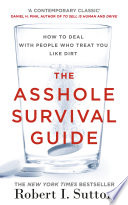

In 'The Asshole Survival Guide,' Robert I. Sutton explores the pervasive issue of toxic behavior in both personal and professional settings. The book serves as a comprehensive manual for recognizing, managing, and ultima...
Continue readingThe first step in surviving encounters with difficult individuals is to recognize them. The author, Robert I. Sutton, defines an 'asshole' as someone who consistently mistreats others and disregards their feelings. This ...
Continue readingEmotional resilience is crucial when dealing with assholes. Sutton emphasizes that individuals must develop their emotional strength to withstand the negative impacts of toxic behavior. This involves cultivating a mindse...
Continue readingOne of the most effective strategies for dealing with assholes is establishing clear boundaries. Sutton discusses the importance of communicating limits to ensure that one’s personal and professional space is respected. ...
Continue readingHow one responds to an asshole can significantly influence the outcome of the interaction. Sutton outlines various strategies for responding effectively, emphasizing the importance of remaining calm and composed. He sugg...
Continue readingSutton emphasizes the importance of having a strong support network when dealing with difficult individuals. This network can provide emotional support, advice, and validation, which can be invaluable in navigating chall...
Continue readingSutton discusses the importance of fostering a positive environment to counteract the effects of toxic individuals. He emphasizes that individuals can take proactive steps to create a culture of respect and collaboration...
Continue readingFinally, Sutton addresses the importance of recognizing when it is time to let go of a toxic relationship or situation. This may involve leaving a job, distancing oneself from a difficult colleague, or even ending a frie...
Continue readingThe reading time for The Asshole Survival Guide depends on the reader's pace. However, this concise book summary covers the 7 key ideas from The Asshole Survival Guide, allowing you to quickly understand the main concepts, insights, and practical applications in around 25 min.
The Asshole Survival Guide is definitely worth reading. The book covers essential topics including Recognizing Assholes, Developing Emotional Resilience, Setting Boundaries, providing practical insights and actionable advice. Whether you read the full book or our concise summary, The Asshole Survival Guide delivers valuable knowledge that can help you improve your understanding and apply these concepts in your personal or professional life.
The Asshole Survival Guide was written by .
If you enjoyed The Asshole Survival Guide by and want to explore similar topics or deepen your understanding, we highly recommend these related book summaries:
These books cover related themes, complementary concepts, and will help you build upon the knowledge gained from The Asshole Survival Guide. Each of these summaries provides concise insights that can further enhance your understanding and practical application of the ideas presented in The Asshole Survival Guide.